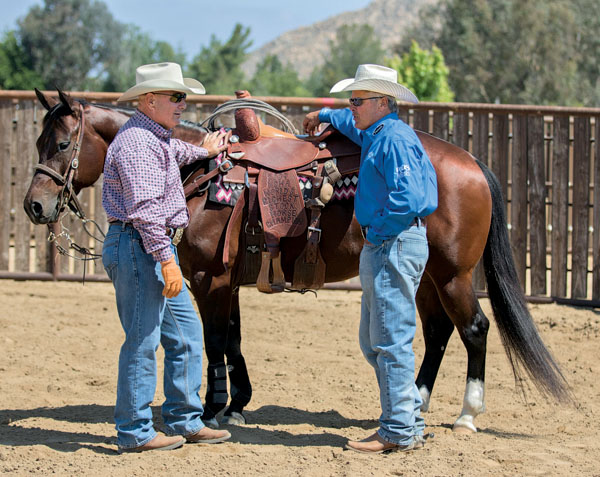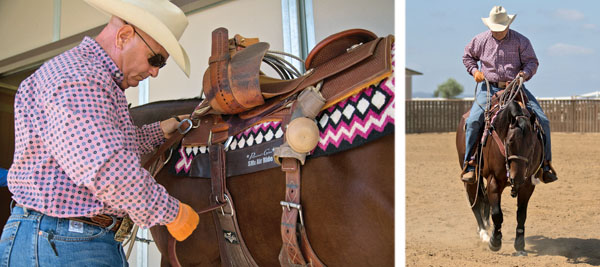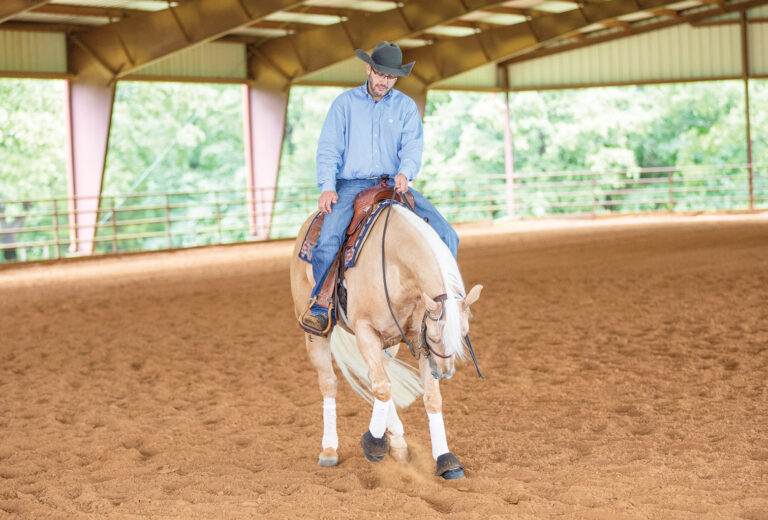I have a beginning-rider customer at my barn who’s had a stellar professional career. He put in the work to advance to his level of personal achievement, has earned the respect of his peers, and is a go-to expert. But, when it comes to horses, he understands that he’s starting from the ground and has a lot to learn.

Setting realistic, achievable goals plays an important role on any path to success. It did for my customer in his professional life, and now it does again as he learns to ride and improve his skills. If you want to achieve something with your horse—whether inside or outside the arena—here are five goal-setting tips to set yourself up for success and ways that they’ve helped my newbie non-pro.
1. Be honest with yourself.
Why set a goal if it’s completely unachievable? A benchmark that’s miles out of your reach will only lead to disappointment and frustration. That’s why brutal honesty pays off when it comes to setting a realistic goal.
Take a good, hard look at where you and your horse are talent-wise. What’s your experience level? What about your horse’s? If neither of you has ever looked at a cow, is it realistic to want to go down the fence at a show next month? Probably not. A realistic expectation would include finding opportunities to expose both you and your horse to cattle in a set time frame.
My customer recognizes that he has a lot to learn, and his honesty with himself makes his educational process quicker. He doesn’t waste his time on unattainable goals that he doesn’t even have the foundation for. He builds step by step.
2. Get the best help you can find.
The worst thing you can do is ride alone. Your vision of yourself and your horse could be distorted and biased. Can you really tell how your lope departure looks from the saddle? A second set of educated eyes can give you a leg up on achieving your goal.
You don’t have to ride with a big-name trainer if that’s not part of your reality, but you should ride with someone who has more experience than you and can help you identify your progress toward your goal. It could be a friend, a competitor, or a professional—the key is that you respect how they train their horses.
By riding at my barn, my customer learns from our experiences and mistakes. He won’t make some common missteps under our guidance, which will smooth out his road to achievement. But when he does make a mistake, he has us there to put him back on track and help him figure out what’s going wrong.
3. Know your limitations.
Recognize that not every horse or rider is suited for every event or level of competition. Horses have physical limitations in the form of things like conformation, athletic ability, and existing conditions or injuries, as well as training. You might be limited by financial circumstances, education/riding skills, time you can commit to riding, or physical problems. These factors play major roles in setting goals and working to achieve them.
If my beginner customer came to me and said, “Bob, I want to win a year-end national title this year,” we’d need to have a long talk about the time, money, effort, and horse required to earn that accolade. We’d then set a more realistic expectation that he could work toward now, with his eye on that greater goal for the future.
4. Find a way to measure progress.
A key component to a goal is that it’s measurable. Otherwise, how do you know if you’re progressing toward it?

Check-in with yourself every so often—every week or month—to see if you’re creeping toward success. Your trusted trainer or mentor plays an important role here, too. Ask for feedback about notable improvements or setbacks. He might notice things that you haven’t or are blind to, because you’re so close to the process. You’ll probably notice slow progress—very few people make leaps forward because it takes time to make sustainable progress.
If you’re like my customer, you might have started out riding just for a fun hobby, but as you see yourself progress, you get more serious about it.
5. Expect roadblocks.
I don’t know if it’s possible—or even necessary—to identify all the roadblocks that you could come up against when setting a new goal or working toward one. Everyone comes up against different things, especially when horses are involved. Injuries and illnesses are just the tip of the iceberg. Keep in mind that roadblocks are part of the experience, and you’re going to encounter them—without a doubt. There’s always something to learn in that situation, whether it be about yourself or your horse, that’ll help you on your way to achieve your current goal and those on down the line.
In my customer’s case, some of the obstacles he’s encountered deal with starting to ride later in life. He’s figured out that it’s going to take more work to get past roadblocks in his own riding, simply because he doesn’t have the muscle memory or physical stamina of other, younger beginner riders.
Handling Setbacks
You’ll stumble on your path to success; it’s part of the experience. But the key is not to dwell on those setbacks. If you drag your setbacks from yesterday into your ride today, you’ll have setbacks again and the cycle will continue. Once it’s over, learn from it, shake it off, and go on. I never worry about yesterday; I always think about tomorrow. That’s what moves you forward.
A multiple AQHA world champion, Avila has also won three NRCHA Snaffle Bit Futurities, the NRHA Futurity, and two World’s Greatest Horseman titles. He received the AQHA Professional Horseman of the Year honor. His Avila Training Stables, Inc., is in Temecula, California. Learn more at bobavila.net.






